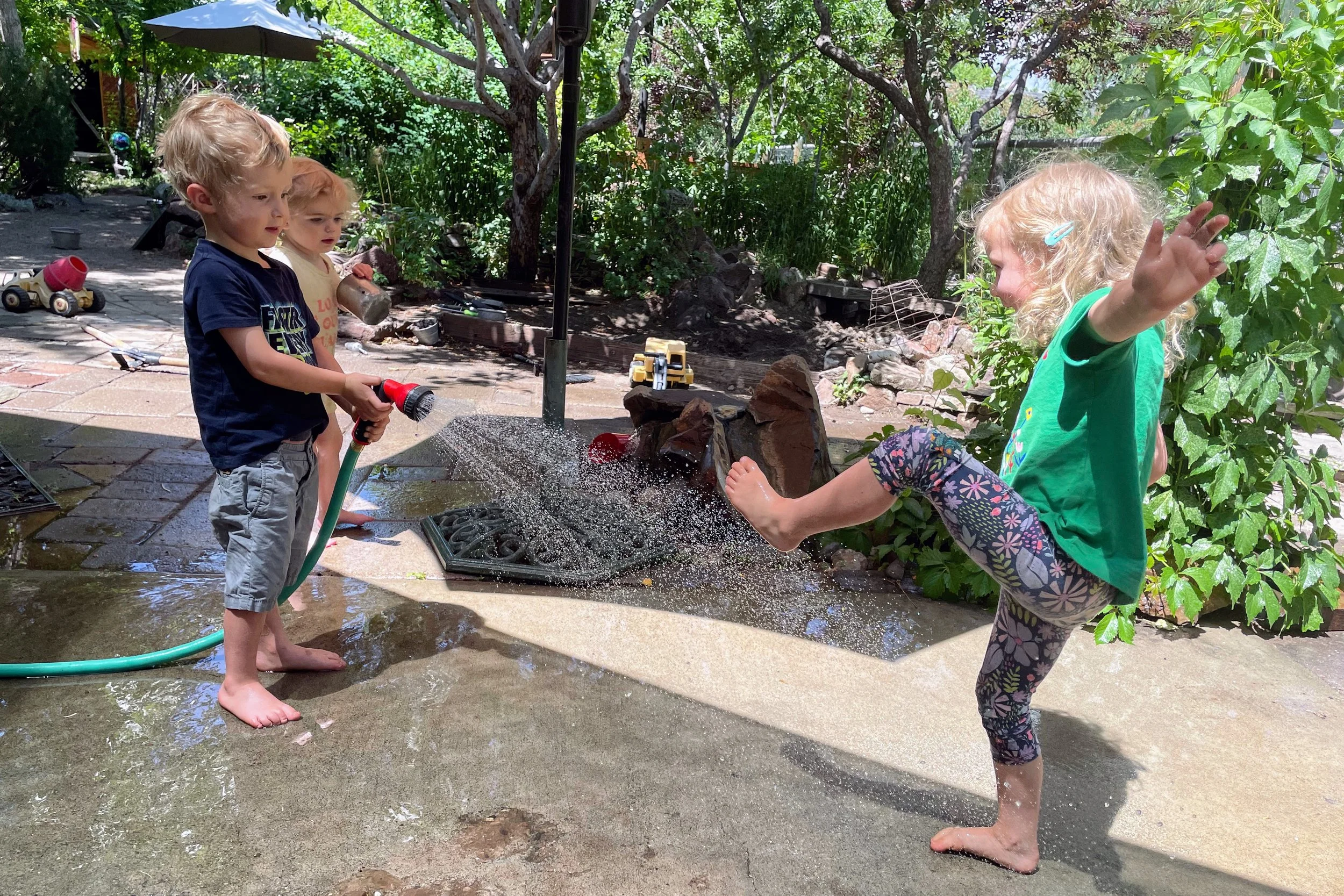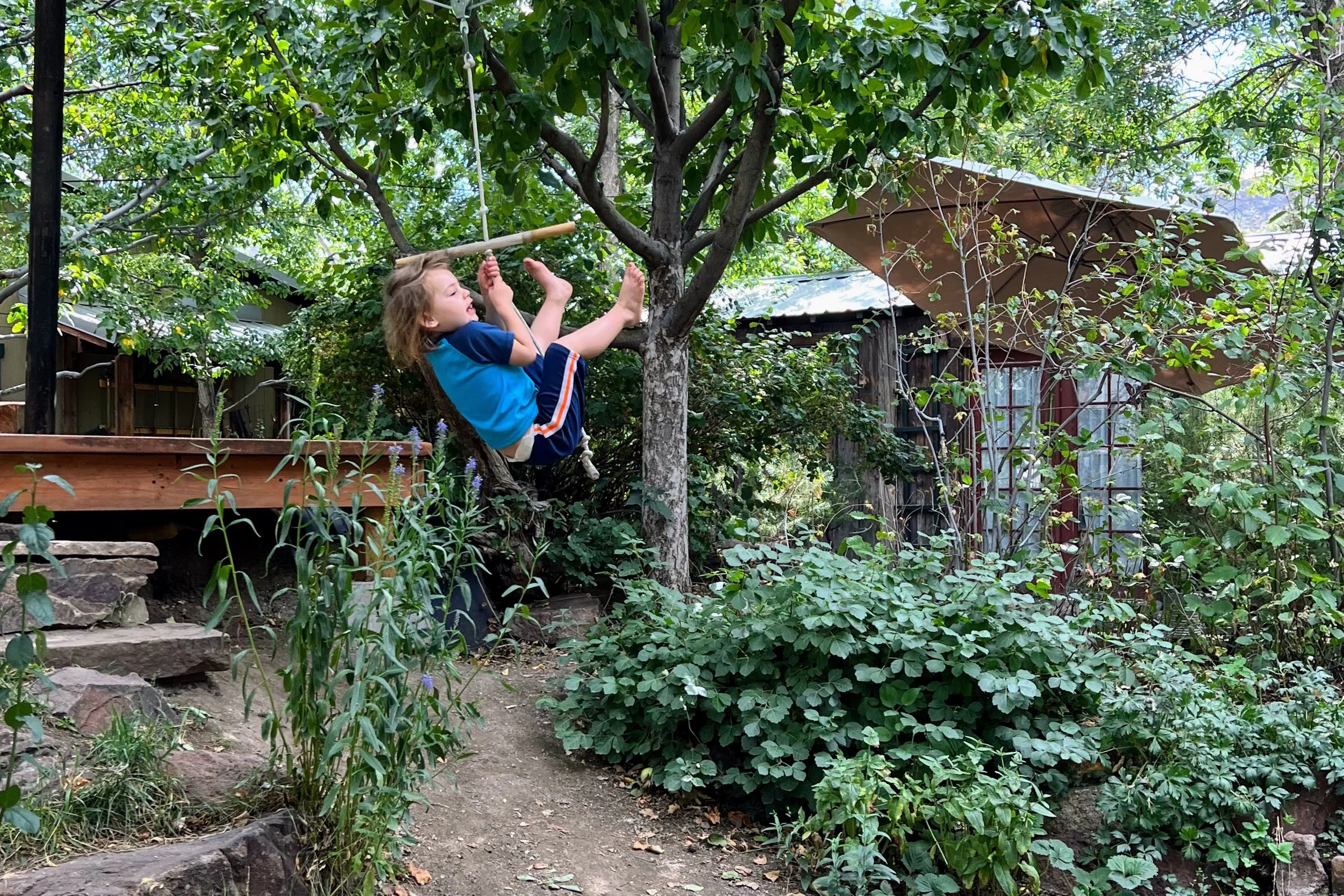Our mission is to provide high-quality childcare for families in the Wood River Valley, creating a safe and enriching environment where children thrive through loving support, free play, and nourishing food.
OUR PHILOSOPHIES
WE ARE A GOLDEN RULE SCHOOL
At Owl House Children’s Sanctuary, we are proud to be a Golden Rule School, where kindness, respect, and empathy guide everything we do. Our approach to early childhood education is rooted in whole-child wellness, emphasizing free play, meaningful connections, and time spent in nature.
By following the Golden Rule—treating others as we wish to be treated—we nurture children’s physical, social-emotional, and intellectual development in a way that feels natural and fulfilling. This philosophy helps children build the confidence, self-awareness, and problem-solving skills needed to live freely in peace with themselves and others.
WE BELIEVE IN THE VALUE OF FREE PLAY
At Owl House Children's Sanctuary, we believe that child-led learning is the most effective approach for fostering young children's development. Here are some key reasons why child-led learning is beneficial for children. Child-led learning:
1. Promotes Intrinsic Motivation: Research shows that when children choose their own activities, they develop a deeper love of learning and maintain their natural curiosity. As Alfie Kohn explains in Punished by Rewards, intrinsic motivation grows when children engage in activities they genuinely enjoy.
2. Encourages Independence and Confidence: Maria Montessori emphasizes in The Absorbent Mind that allowing children to lead their own learning helps them build confidence and independence as they make choices and solve problems on their own.
3. Supports Natural Development: John Holt argues in How Children Learn that children are naturally curious and capable learners. By following their interests, children learn at their own pace and in ways that make sense to them.
4. Enhances Cognitive and Social Skills: Peter Gray's research in Free to Learn shows that self-directed play and exploration help children develop critical cognitive skills and social competencies as they interact with their environment and peers.
By prioritizing child-led learning, we ensure that each child's unique needs and interests are met, creating a nurturing and stimulating environment for their growth.
WE LOVE VEGETABLES
We make all the food here at Owl House each day and are proud of what we serve. We prioritize organic or non-GMO ingredients whenever possible and offer plenty of protein, complex carbs, and our favorite, vegetables. At lunch, we serve a wide variety so that everyone has something they enjoy. The children often see their friends loving different vegetables, and the result — most everyone LOVES vegetables!
We once took a class with Jamie Truppi, MS, CNS (Functional Nutritionist, author of Clean Food, Messy Life, Edible Educator, and former Owl House parent) about feeding children. Her guidance helped shape how we approach food and mealtimes at Owl House. Jamie taught us:
Our job is to provide a wide range of quality, whole foods at regular times. The children’s job is to decide what to eat and how much. Beyond that, we don’t urge. We simply offer.
Building healthy eating habits and encouraging curiosity around food is more important than what a child eats on any given day. Asking children to clean their plate or take “just one bite” doesn’t always support long-term nutrition, especially if it comes with pressure or praise. That kind of approach teaches children to please others rather than listen to their own hunger and fullness. We aim to help them trust their bodies and their senses.
Since learning from Jamie, we’ve let go of mealtime battles. We focus on offering nourishing, nutrient-dense choices, knowing that each child’s food exploration will unfold in their own time. When a child says they’re done eating, we ask them to check in with their bellies, and if they’re sure, they’re free to be excused. It’s been a joy to let go of “no-thank-you bites.” Thank you, Jamie!
WE OFFER ADVENTUROUS PLAY
At Owl House Children’s Sanctuary, we believe that adventurous play is extremely beneficial for growing brains and bodies.
For an extensive and detailed look at this subject, we refer you to Adventure – The Value of Risk in Children’s Play, an Alliance for Childhood publication by Joan Almon that looks at the value of risk from many angles, including interviews with directors of adventure playgrounds that encourage adventurous play, yet have very low accident rates. The key takeaway? When children are given genuine opportunities to assess risk, they rise to the challenge, building confidence, problem-solving skills, and resilience along the way. At Owl House, we embrace this philosophy by providing adventurous and age-appropriate play opportunities, allowing children to challenge themselves in a safe and supportive environment.
Almon explains in Adventure, “Children’s free play is full of risk-taking, a fact that frightens many adults who have become risk-averse. Yet many experts feel that this aversion is excessive and even harmful. They point to children’s natural capacity for risk-assessment which needs to be developed rather than suppressed.”
This is the Owl House free play philosophy, the reason we intentionally provide many places to explore, strider bikes to ride, low walls to jump off, low trees to climb, and a child-sized zipline. We consider these activities to be important aspects of their independent play, and that the value of an Owl House day would be diminished without these physical challenges.
WE BELIEVE IN MINDFUL CONFLICT RESOLUTION
Mindful conflict resolution helps children develop emotional intelligence, self-regulation, and empathy—all essential skills for navigating relationships and solving problems. Research from The Whole-Brain Child and Peaceful Parent, Happy Kids shows that when children are guided through conflict with patience and understanding, they learn how to express emotions constructively, consider others’ perspectives, and resolve challenges with confidence.
Examples of Mindful Conflict Resolution:
Listening to Each Child's Perspective: We encourage children to share their feelings and viewpoints before resolving conflicts (Peaceful Parent, Happy Kids by Dr. Laura Markham).
Guided Problem-Solving: We facilitate discussions, helping children brainstorm solutions and agree on a fair outcome (The Whole-Brain Child by Daniel J. Siegel & Tina Payne Bryson).
Emotion Coaching: We help children identify their emotions and provide strategies to manage them effectively (Simplicity Parenting by Kim John Payne).
Modeling Respectful Communication: We demonstrate respectful interactions, teaching children by example (No-Drama Discipline by Daniel J. Siegel & Tina Payne Bryson).
By incorporating these mindful practices, we aim to create a peaceful and supportive atmosphere where every child can thrive.





